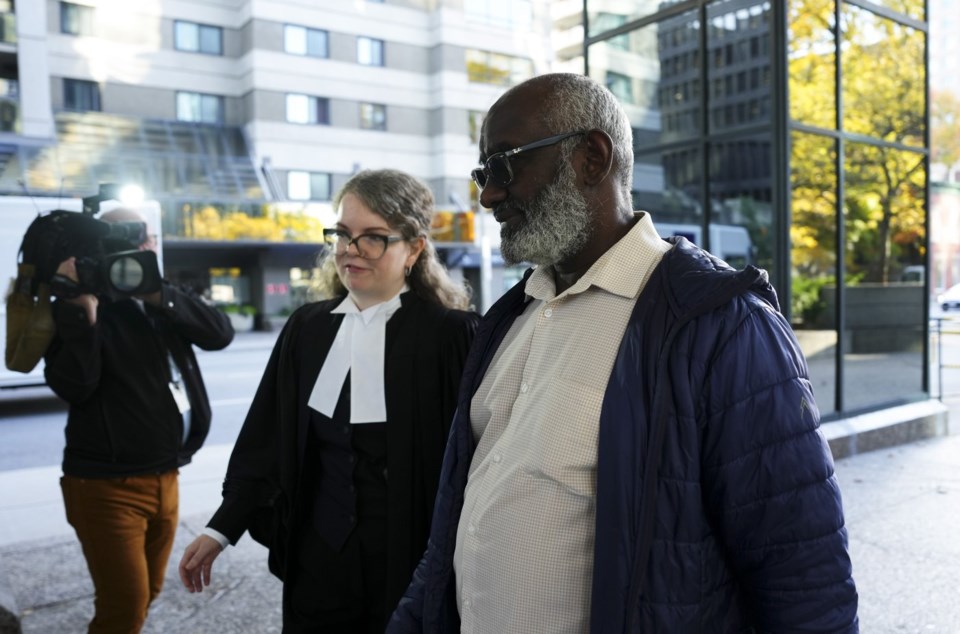OTTAWA ŌĆö Abousfian Abdelrazik wiped away tears as he told a court Tuesday about being imprisoned in Sudan two decades ago.
He is suing the 91įŁ┤┤ government for $27 million, claiming officials arranged for his arbitrary imprisonment, encouraged his detention by Sudanese authorities and actively obstructed his repatriation to Canada for several years.
Abdelrazik came to Canada from Sudan as a refugee, settling in Montreal and later becoming a 91įŁ┤┤ citizen.
He was arrested in September 2003 while in his native country to see his ailing mother.
In October of that year, Abdelrazik was interrogated in custody by 91įŁ┤┤ Security Intelligence Service officers about suspected extremist links.
He says he was also tortured during two periods of detention by the Sudanese intelligence agency.
Abdelrazik, 62, denies involvement in terrorism.
He returned to Canada in 2009 after a judge ruled Ottawa breached his constitutional rights by refusing to give him an emergency travel document.
Federal lawyers argue Abdelrazik was the author of his own misfortune, saying Canada did not urge Sudan to keep him in detention or mistreat him, or create a risk that these things might happen.
CSIS first took an interest in Abdelrazik in 1996 due to his association with people suspected of being national security threats, says an agreed statement of facts in the case.
At the prompting of CSIS, the RCMP initiated a criminal investigation of three suspects including Abdelrazik. By November 2022, the Mounties concluded they did not have sufficient evidence to charge Abdelrazik with any crime.
Even so, CSIS investigators interviewed him on four occasions between April 2001 and February 2003.
He left for Khartoum on March 22, 2003, and CSIS was informed of his arrival five days later.
CSIS continued investigating Abdelrazik and shared information with domestic and foreign partners.
He was arrested in Sudan on Sept. 10, 2003.
Abdelrazik lost his composure several times Tuesday in Federal Court as his lawyer, Paul Champ, led him through the events of his tumultuous incarceration.
CSIS sent questions to be put to Abdelrazik by Sudanese authorities. But officers from the 91įŁ┤┤ spy service then showed up in person to interrogate him over two days in late October 2003.
Abdelrazik recognized one of the officers from an earlier encounter in Montreal.
They asked about his activities in Canada, his knowledge of people in Montreal and his association with individuals linked to terrorist activity.
Abdelrazik told the court that at the end of the second meeting, he asked the CSIS officers to tell his family where he was.
"And then they said, 'We're not gonna help a terrorist guy.'"
He said he was told Canada didn't need him and that he would stay in Sudan forever, much like the prisoners at a U.S. facility in Cuba.
"Sudan is going to be your Guantanamo."
Abdelrazik took a tearful pause while recalling how David Hutchings, an official from the 91įŁ┤┤ Embassy in Khartoum, brought him a letter from his daughter during his first consular visit in December 2003.
Abdelrazik told Hutchings he did not know why he was being held.
That same day, according to the agreed statement, Hutchings was told that Abdelrazik was being detained because Canada had requested it. Hutchings was advised that if Canada wanted him released, it should make a request in writing.
Around this time, there were escapes from the state security prison where Abdelrazik was being held.
He told the court a senior intelligence official demanded information from himself and other detainees about how the prisoners escaped. Abdelrazik said they were ordered to face a wall, then kicked in the back, slapped on the head and flogged with a rubber hose "in the back, the head, everywhere."
This report by The 91įŁ┤┤ Press was first published Oct. 22, 2024.
Jim Bronskill, The 91įŁ┤┤ Press



